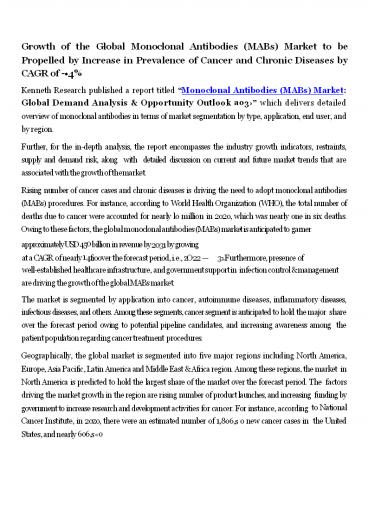Monoclonal Antibodies (MABs) Market Size, Research, Analysis - PowerPoint PPT Presentation
Title:
Monoclonal Antibodies (MABs) Market Size, Research, Analysis
Description:
The global monoclonal antibodies (MABs) market is estimated to garner around USD 450 billion in revenue by 2031 by growing at a CAGR of nearly 14% over the forecast period, i.e., 2022 – 2031. The growth of the market can be attributed to increase in prevalence of cancer, rising demand for cost-efficient biosimilar monoclonal antibodies, and increase in R&D activities. – PowerPoint PPT presentation
Number of Views:6
Title: Monoclonal Antibodies (MABs) Market Size, Research, Analysis
1
Growth of the Global Monoclonal Antibodies (MABs)
Market to be Propelled by Increase in Prevalence
of Cancer and Chronic Diseases by CAGR of
-4 Kenneth Research published a report titled
Monoclonal Antibodies (MABs) Market Global
Demand Analysis Opportunity Outlook ao3 which
delivers detailed overview of monoclonal
antibodies in terms of market segmentation by
type, application, end user, and by
region. Further, for the in-depth analysis, the
report encompasses the industry growth
indicators, restraints, supply and demand risk,
along with detailed discussion on current and
future market trends that are associated with
the growth of the market. Rising number of cancer
cases and chronic diseases is driving the need to
adopt monoclonal antibodies (MABs) procedures.
For instance, according to World Health
Organization (WHO), the total number of deaths
due to cancer were accounted for nearly lo
million in 2o2o, which was nearly one in six
deaths. Owing to these factors, the global
monoclonal antibodies (MABs) market is
anticipated to garner approximately USD 450
billion in revenue by 2031 by growing at a CAGR
of nearly 14fioover the forecast period, i.e.,
zO22 31.Furthermore, presence
of well-established healthcare infrastructure,
and government support in infection control
management are driving the growth of the global
MABs market. The market is segmented by
application into cancer, autoimmune diseases,
inflammatory diseases, infectious diseases, and
others. Among these segments, cancer segment is
anticipated to hold the major share over the
forecast period owing to potential pipeline
candidates, and increasing awareness among the
patient population regarding cancer treatment
procedures. Geographically, the global market is
segmented into five major regions including North
America, Europe, Asia Pacific, Latin America and
Middle East Africa region. Among these regions,
the market in North America is predicted to hold
the largest share of the market over the forecast
period. The factors driving the market growth in
the region are rising number of product launches,
and increasing funding by government to increase
research and development activities for cancer.
For instance, according to National Cancer
Institute, in 2ozo, there were an estimated
number of 1,8o6,s o new cancer cases in the
United States, and nearly 6o6,so
2
people died from the disease. Additionally, the
market in Asia Pacific region is projected to be
the fastest growing region in the global
monoclonal antibodies (MABs) market. The research
is global in nature and covers detailed analysis
on the market in North America (U.S., Canada),
Europe (U.K., Germany, France, Italy, Spain,
Hungary, Belgium, Netherlands Luxembourg,
NORDIC Finland, Sweden, Norway, Denmarkj,
Poland, Turkey, Russia, Rest of Europe), Latin
America (Brazil, Mexico, Argentina, Rest of Latin
America), Asia-Pacific (China, India, Japan,
South Korea, Indonesia, Singapore, Malaysia,
Australia, New Zealand, Rest of Asia-Pacific),
Middle East and Africa (Israel, GCC Saudi
Arabia, UAE, Bahrain, Kuwait, Qatar, Oman, North
Africa, South Africa, Rest of Middle East and
Africa). In addition, analysis comprising market
size, Y-O-Y growth opportunity analysis,
market players' competitive study, investment
opportunities, demand for future outlook etc.
has also been covered and displayed in the
research report. Request sample report -
https//www.kennethresearch.com/sample-request-100
70561 Jtise in Aitareness Among Patients
Physicians Related to the Hpplicntions oJ
fonoclonnl Antibodies (MAZfs9 therapy to Boost
the Marlcet Groufh Rising awareness among
patients and physicians related to the
applications of monoclonal antibodies (MABs)
therapy are expected to increase the demand for
MABs procedures. This is a key factor that is
anticipated to drive the growth of the market
during the forecast period. Growing cancer and
chronic diseases, and increasing geriatric
population are also expected to boost the market
growth in the upcoming years. Moreover, the
rising demand for cost-efficient biosimilar
monoclonal antibodies is predicted to propel the
growth of the global MABs market
further. However, stringent regulatory policies
for approval process, poor demand in under-
developed countries, and potential side effects
of these drugs are expected to operate as key
restraints to the growth of the global monoclonal
antibodies (MABs) market over the forecast
period. This report also provides the existing
competitive scenario of some of the key players
of the global monoclonal antibodies (MABs)
market which includes company profiling of Amgen
Inc., AstraZeneca, Bayer AG, Merck KGaA, Eli
Lilly and Company, GlaxoSmithKline plc., BioMed
Central Ltd., Novartis AG, American Medical
Association, Elabscience Biotechnology Inc., and
others. The profiling enfolds key information of
the companies which encompasses business
3
overview, products and services, key financials
and recent news and developments. On the whole,
the report depicts detailed overview of the
global monoclonal antibodies (MABs) market that
will help industry consultants, equipment
manufacturers, existing players searching for
expansion opportunities, new players searching
possibilities and other stakeholders to align
their market centric strategies according to the
ongoing and expected trends in the
future. Request sample report -
https//www.kennethresearch.com/sample-request-100
70561 Kenneth Research is a leading service
provider for strategic market research and
consulting. We aim to provide unbiased,
unparalleled market insights and industry
analysis to help industries, conglomerates and
executives to take wise decisions for their
future marketing strategy, expansion and
investment etc. We believe every business can
expand to its new horizon, provided a right
guidance at a right time is available through
strategic minds. Our out of box thinking helps
our clients to take wise decision in order to
avoid future uncertainties. Contact for more
Info AJ Daniel Email sales_at_kennethresearch.com U
.S. Phone 3 3 46a o6O9































